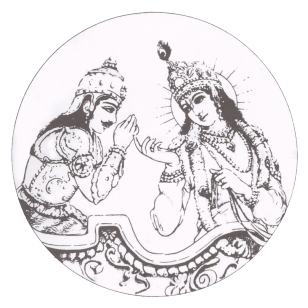BG 14 (1972)

BG 14.1 (1972): The Blessed Lord said: Again I shall declare to you this supreme wisdom, the best of all knowledge, knowing which all the sages have attained to supreme perfection.
BG 14.2 (1972): By becoming fixed in this knowledge, one can attain to the transcendental nature, which is like My own nature. Thus established, one is not born at the time of creation nor disturbed at the time of dissolution.
BG 14.3 (1972): The total material substance, called Brahman, is the source of birth, and it is that Brahman that I impregnate, making possible the births of all living beings, O son of Bharata.
BG 14.4 (1972): It should be understood that all species of life, O son of Kuntī, are made possible by birth in this material nature, and that I am the seed-giving father.
BG 14.5 (1972): Material nature consists of the three modes-goodness, passion and ignorance. When the living entity comes in contact with nature, he becomes conditioned by these modes.
BG 14.6 (1972): O sinless one, the mode of goodness, being purer than the others, is illuminating, and it frees one from all sinful reactions. Those situated in that mode develop knowledge, but they become conditioned by the concept of happiness.
BG 14.7 (1972): The mode of passion is born of unlimited desires and longings, O son of Kuntī, and because of this one is bound to material fruitive activities.
BG 14.8 (1972): O son of Bharata, the mode of ignorance causes the delusion of all living entities. The result of this mode is madness, indolence and sleep, which bind the conditioned soul.
BG 14.9 (1972): The mode of goodness conditions one to happiness, passion conditions him to the fruits of action, and ignorance to madness.
BG 14.10 (1972): Sometimes the mode of passion becomes prominent, defeating the mode of goodness, O son of Bharata. And sometimes the mode of goodness defeats passion, and at other times the mode of ignorance defeats goodness and passion. In this way there is always competition for supremacy.
BG 14.11 (1972): The manifestations of the mode of goodness can be experienced when all the gates of the body are illuminated by knowledge.
BG 14.12 (1972): O chief of the Bhāratas, when there is an increase in the mode of passion, the symptoms of great attachment, uncontrollable desire, hankering, and intense endeavor develop.
BG 14.13 (1972): O son of Kuru, when there is an increase in the mode of ignorance madness, illusion, inertia and darkness are manifested.
BG 14.14 (1972): When one dies in the mode of goodness, he attains to the pure higher planets.
BG 14.15 (1972): When one dies in the mode of passion, he takes birth among those engaged in fruitive activities; and when he dies in the mode of ignorance, he takes birth in the animal kingdom.
BG 14.16 (1972): By acting in the mode of goodness, one becomes purified. Works done in the mode of passion result in distress, and actions performed in the mode of ignorance result in foolishness.
BG 14.17 (1972): From the mode of goodness, real knowledge develops; from the mode of passion, grief develops; and from the mode of ignorance, foolishness, madness and illusion develop.
BG 14.18 (1972): Those situated in the mode of goodness gradually go upward to the higher planets; those in the mode of passion live on the earthly planets; and those in the mode of ignorance go down to the hellish worlds.
BG 14.19 (1972): When you see that there is nothing beyond these modes of nature in all activities and that the Supreme Lord is transcendental to all these modes, then you can know My spiritual nature.
BG 14.20 (1972): When the embodied being is able to transcend these three modes, he can become free from birth, death, old age and their distresses and can enjoy nectar even in this life.
BG 14.21 (1972): Arjuna inquired: O my dear Lord, by what symptoms is one known who is transcendental to those modes? What is his behavior? And how does he transcend the modes of nature?
BG 14.22-25 (1972): The Blessed Lord said: He who does not hate illumination, attachment and delusion when they are present, nor longs for them when they disappear; who is seated like one unconcerned, being situated beyond these material reactions of the modes of nature, who remains firm, knowing that the modes alone are active; who regards alike pleasure and pain, and looks on a clod, a stone and a piece of gold with an equal eye; who is wise and holds praise and blame to be the same; who is unchanged in honor and dishonor, who treats friend and foe alike, who has abandoned all fruitive undertakings-such a man is said to have transcended the modes of nature.
BG 14.26 (1972): One who engages in full devotional service, who does not fall down in any circumstance, at once transcends the modes of material nature and thus comes to the level of Brahman.
BG 14.27 (1972): And I am the basis of the impersonal Brahman, which is the constitutional position of ultimate happiness, and which is immortal, imperishable and eternal.